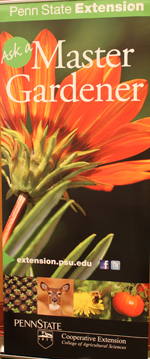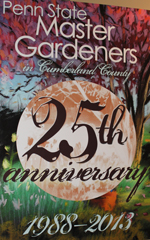About the Master Gardener Program

|
Penn State Master Gardeners are a community of volunteers who support the Penn State University Cooperative Extension's educational programs and Outreach in consumer horticulture. We invite you to learn more about us and our programs. The mission of the Penn State MG volunteer program is to support the Penn State Cooperative Extension by utilizing research-based information to educate the public on best practices in consumer horticulture and environmental stewardship. Master Gardeners are volunteers trained by the Penn State Cooperative Extension. Once they complete their training, Master Gardeners help the Extension better serve the home gardening public by answering questions, speaking to groups, working with 4-H horticultural projects, participating in civic beautification, maintaining demonstration gardens, teaching plant sciences and horticulture, maintaining this web site, and in many other ways. Master Gardeners are willing and able to educate individuals and groups in gardening topics such as plant selection, composting, soil improvement, pest control, vegetable and flower gardening, pruning, and more. |

|
HistoryThe program was initiated in 1972 in Seattle, Washington in response to questions posed to Cooperative Extension. David Gibby, an Extension Agent in King County, is credited for designing the Master Gardener program to meet the demand for reliable home gardening information.The Master Gardener program was so successful in the state of Washington that it was adopted by many other states within a few years. Today, the program is active in 48 States, the District of Columbia, and three Canadian provinces. Penn State Cooperative Extension adopted the Master Gardener program in 1982. Currently, there are 1400 volunteers within 58 of Pennsylvania’s counties. The Cumberland County Master Gardener program CELEBRATES it's 25th anniversary this year (2013) ! |
ServiceExamples of the services provided by the Cumberland & Perry County Master Gardeners include:
|
|

|
Becoming a Master GardenerTo become a Master Gardener, individuals take classes for 15-16 weeks (40-45 hours) and need to successfully pass the Penn State Master Gardener exam. The training courses are designed to provide experienced home gardeners with the information and skills necessary to share their experience and knowledge with others. Master Gardener trainees must then complete an individual research based presentation, a class group project and 50 hours of volunteer service in their first year. Upon successful completion, the trainee is awarded a Penn State Master Gardener certificate. Master Gardener certification is restrictive in that it is valid only while the individual is participating in the Penn State Master Gardener program. Core and Additional classes varing by county include:
Master Gardener training is offered for Cumberland and Perry Counties jointly in alternating years. The next class will begin in 2014. For more information please contact Annette MaCoy, Consumer Horticulture Educator, at the Cumberland County Penn State Cooperative Extension office located at 310 Allen Road, Suite 601 in Carlisle, by calling 717-240-6500 or emailing to: ahm11@psu.edu |
|
* The Pennsylvania State University is committed to the policy that all persons shall have equal access to programs, facilities, admission, and employment without regard to personal characteristics not related to ability, performance, or qualifications as determined by University policy or by state or federal authorities. It is the policy of the University to maintain an academic and work environment free of discrimination, including harassment. The Pennsylvania State University prohibits discrimination and harassment against any person because of age, ancestry, color, disability or handicap, national origin, race, religious creed, sex, sexual orientation, gender identify, or veteran status. Discrimination or harassment against faculty, staff, or students will not be tolerated at The Pennsylvania State University. Direct all inquiries regarding the nondiscrimination policy to the Affirmative Action Director. The Pennsylvania State University, 328 Boucke Building, University Park, PA 16802-5901: Tel 814-865-4700/V, 814-863-1150/TTY. |


 CumberlandPerryMG
CumberlandPerryMG